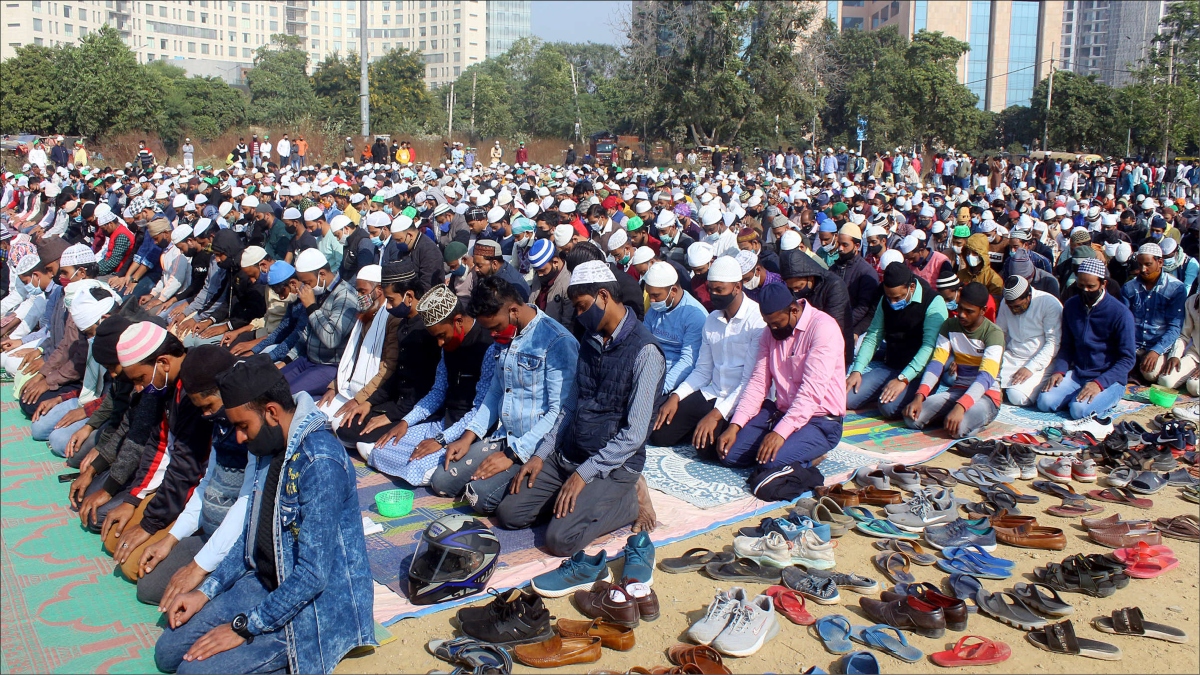On his way back from Chandigarh Shams Khawaja decided to take an unusual route. As he drove past on a wet road through a village, he heard the Azaan for the evening prayers.
Realising it was time to pray he stopped near a temple, came out of his car with janamaaz (prayer mat) and began unfolding it to offer his prayer on a chabutra near the temple. Then, he heard a strange voice call out from inside the temple- “Stop…What are you doing Mister?”
“What’s the problem, should I not be offering my prayers here?” Shams said. The stranger rushed towards Shams, a Delhi-based Supreme Court lawyer in his late 50s traveling for an official business.
The stranger turned out to be the temple priest, “Follow me,” he said. The priest ushered Shams into his small room in the temple premises. “It rained today and the floor is wet. It›s better you offer your namaaz here,” the temple priest said and left Shams to pray in his room.
You will find many such examples, which will make you rethink whether India is actually a country where communal hatred has taken deep roots. Such examples strengthen the resolve of faith in the Indian Muslims. They realise their ancestors’ decision of not going to Pakistan at the time of the partition was right.
All great Muslim leaders in Independent India such as Abul Kalam Azad were in politics to serve all Indians at large and not specifically the Indian Muslims. They abstained from politics based on religion and perhaps, religion had the least priority in their politics.
However, in the reactionary politics of today, there is a tendency among a section of Muslims to believe they would be better off if they have their own political party— controlled and run either by a Muslim leader or support of those leaders who appear to be sympathetic to the Muslims.
They believe siding with such players will make them a stakeholder in the government, which will, in turn, give them a feeling of safety, and bargaining power to improve their condition.
That’s why several local Muslim leaders are growing in stature, regional political parties, which appear to be having soft corners for Muslims are trying to derive political mileage and make the most of the support they are getting from the Muslims.
Clearly, such forces only wish to win the elections on the basis of the religion card. But by siding with such leaders and parties Muslims are not doing any good for their community. They are leading the community to a confrontationist path rather than helping them get justice.
The community must ask itself whether such people actually have any road map for their development. When you reflect on this you will realise that these leaders do not think beyond the communal divide for their political gains.
Some of these people are even puppets in the hands of greater political forces. And when you play in the hands of such leaders you might end up getting nothing and losing much.
The so-called secular parties which have ruled for decades saw Muslims merely as a vote bank and have not paid much attention to their real issues. Otherwise, their condition would not have been so bad. They have also played on the insecurity of Muslims to get their votes.
Islam teaches that Allah is the sustainer of the universe and not just of the Muslims. Even the concept of zakat (alms) in Islam doesn’t distinguish on religious grounds, it says if you see a needy person, then the Muslims are duty-bound to give them charity irrespective of the recipient’s religion.
Similarly supporting a political party merely on religious grounds is against the basic tenants of Islam. Abdul Samad, a Delhi-based educational technologist and media analyst believes there was never a time and there is no time for promoting a political party with a Muslim identity.
The divisive stand is anathema to Islamic principles and the essence of the Muslim concept of self, which is a very inclusive concept, which when practised by the Prophet Mohammad himself led to the formation of the first secular state in Medina.
It became an inspiration and role model for ulemas and their faithful Muslim followers in India for a composite nation, their historic and revolutionary rejection of Jinnah’s two-nation theory.
S Y Qureshi, former election commissioner of India has similar views. He says it is a bad idea for Muslims even to think of promoting a party on religious grounds. He says they should rather be part of a secular party. The idea of a political party with a Muslim identity is not doable in India. At the most such party would best get 10-15 per cent vote share but they cannot form a government on their own.
Muslims should be supporting able leaders within their community or those who inspire confidence for delivering on the real issues of social-economic justice.
The main challenge of a leader is to think beyond playing upon the basic insecurity of Muslims due to their religious identity and work on improving their education and economic conditions.
The leader needs to be tactful in representing the genuine issues of Muslims amongst the conflict which arises due to the sharing of resources and opportunities.
Indian Union Muslim League has been in existence ever since the country’s Independence. Most of their office-bearers are Muslims, even those who contribute money for the party are Muslims. But what good has the party done for the Indian Muslims?
Though it is identified as a party of Muslims it has not been able to even emerge out of Kerala in a big way, let alone become a national party. There are lessons to be learnt from this experience. Supporting a political party merely only the basis of religion will not take Muslims anywhere.
Muslims should be choosing a leader, who stays on the course of their development. Such visionary leaders may lose the elections but sooner or later they will play a significant role in the development of the community.
When leaders like Maulana Azad, Hafiz Mohd Ibrahim and Maulana Hifzur Rehman were there the majority of Hindus never felt alienated by their Islamic principles of integrity, humanism and secularism.
The outstanding examples of this from India’s own history are the famous byelections of 1937, in which Hafiz Mohd Ibrahim of Congress defeated the Muslim league handsomely in Bijnaur, UP under an election fought on the basis of the British policy of separatism promulgated as the separate electorates in which Hindus could vote for Hindus only and Muslims for Muslims only.
In this election, Jinnah himself campaigned and begged the electorate to vote for the community and reject the candidature of Hafiz Mohd Ibrahim, even when he was a good individual because in his eyes Muslims were a separate nation and this was more important.
Khan Abdul Ghaffar Khan brought his red shirts to rally behind the call of Hafiz Mohd Ibrahim for a united India. When the results were declared, the Muslim League had received a drubbing as Hafiz Mohd Ibrahim romped home with a thumping margin.
This particular election result reverberated in the House of Commons in the UK where it was debated that the Muslims of India were not solely behind the Muslim League for the division of the country as was being claimed.
Hafiz Ibrahim’s cousin Maulana Hifzur-Rehman who was a member of the Constituent Assembly close colleague of Jawaharlal Nehru and Sardar Patel and a partner in Mahatma Gandhi’s Dandi March registered his vehement objection to the partition of the country by raising his hand against AICC resolution on the division of India.
Unfortunately, with the demise of such great leaders and the hijacking of their agendas by pseudo-secular political parties, the Hindu reaction took the shape of an ultra-right ideology gaining an upper hand.
The Muslim appeasement policies of Congress have not done anything meaningful for the community. Instead, such outreach has only damaged the prospects of the party.
Muslims need to stick their neck out and assert firmly that they have nothing to do with Jinnah. Why is the community being dragged in this binary by the political parties? Muslims’ needs are no different from any other Indian—they also need roti, kadpa aur makan (food, clothes, and shelter) just like any other Indian.
In a recent press conference, Asaduddin Owasi of the AIMIM said he would take on Yogi Adityanath and will win the elections. When one of the journalists asked him how would that be possible, he replied that people should vote for him with their hearts and not their minds.
Today UP elections are being contested on the basis of religion and casteism. Muslims are being told that if they wish to feel safe in this country, then they should vote to oust the BJP. The elections are being projected as being decisive for deciding the Muslim’s fate in India.
However, the gimmick of strategic Muslim voting is all set to topple on its head. Here’s why. Samajwadi Party, Bahujan Samaj Party, Congress, AAP have given a whole lot of tickets to Muslims. Plus, there is Asaduddin Owaisi who is now said to be having as per recent reports a significant influence in at least 40 seats which SP, BSP or Congress would have won by a slender margin of 1500-2000 votes.
In the present scheme of things, Muslim votes are bound to be divided, especially in the constituencies where Muslim candidates from different parties will clash against each other, dividing Muslim votes and rendering them useless. This is common sense and needs no rocket science to understand the equations.
The writing is on the wall and BJP seems to be having a smooth sail. But after the BJP wins it could set another dangerous line of thought that Muslim votes are insignificant and the party need not care for the community. That is another thing that there is nothing constant in politics and it is always in a state of flux.
However, there needs to be a change in the attitude of Muslims as far as their motivation for voting is concerned, only then political parties would respond to them positively and meaningfully. Otherwise, they will only remain as vote banks.
Muslims need to lay emphasis on the education of their children. They should promote NGOs working in the field of education and allow them to penetrate into the community so that at least the next generation will take informed decisions and vote sensibly and not impulsively.
A good leader need not even win elections immediately to bring about improvement in the community. He would be much more useful than the one who would put the community in the confrontationist path.
Sir Syed Ahmed Khan is one such great example of a person, who never won the elections but became a revolutionary in the education of the Muslim community. He had a vision and he stayed with his conviction and took up the challenges of taking on orthodox elements within the community and also created favourable conditions for the community by working with those in power.







